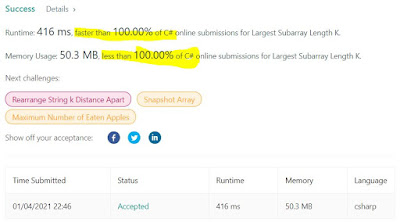Happy New Year! Easy problem by LC
Hello Everyone, and Happy New Year to all of you, wishing you to stay safe and sound, and to have a kick-ass 2021 ahead. In other words, wishing that Happiness(2021) >> Happiness(2020).
The first problem of the year seems computationally challenging, if it wasn't for one phrase. Here it is: Largest Subarray Length K - LeetCode
An array A is larger than some array B if for the first index i where A[i] != B[i], A[i] > B[i].
For example, consider 0-indexing:
[1,3,2,4] > [1,2,2,4], since at index1,3 > 2.[1,4,4,4] < [2,1,1,1], since at index0,1 < 2.
A subarray is a contiguous subsequence of the array.
Given an integer array nums of distinct integers, return the largest subarray of nums of length k.
Example 1:
Input: nums = [1,4,5,2,3], k = 3 Output: [5,2,3] Explanation: The subarrays of size 3 are: [1,4,5], [4,5,2], and [5,2,3]. Of these, [5,2,3] is the largest.
Example 2:
Input: nums = [1,4,5,2,3], k = 4 Output: [4,5,2,3] Explanation: The subarrays of size 4 are: [1,4,5,2], and [4,5,2,3]. Of these, [4,5,2,3] is the largest.
Example 3:
Input: nums = [1,4,5,2,3], k = 1 Output: [5]
Constraints:
1 <= k <= nums.length <= 1051 <= nums[i] <= 109- All the integers of
numsare unique.
Indeed, because the numbers are all unique, you can avoid the K*Nums.Length complexity (which would be intractable since that would explode to 10^10) and rather perform an O(N) search. In fact, all you have to do is look for the largest number :) That will be the beginning of your sub-array. Solution works, and fast. Code is below, cheers, ACC.
public int[] LargestSubarray(int[] nums, int k)
{
int maxVal = 0;
int maxIndex = 0;
for (int i = 0; i < nums.Length - k + 1; i++)
{
if (nums[i] > maxVal)
{
maxVal = nums[i];
maxIndex = i;
}
}
int[] retVal = new int[k];
for (int i = 0; i < k; i++)
{
retVal[i] = nums[i + maxIndex];
}
return retVal;
}




Comments
Post a Comment